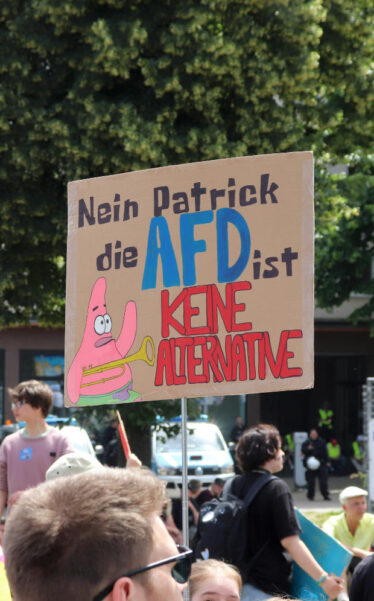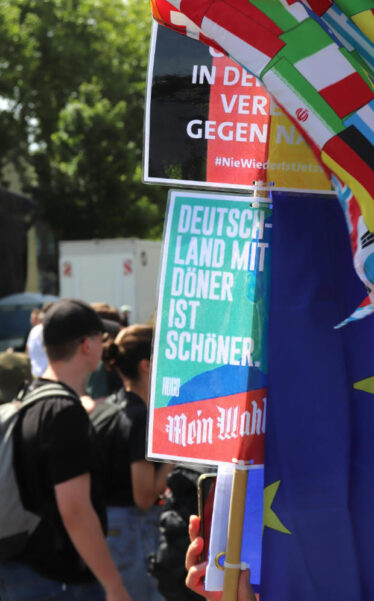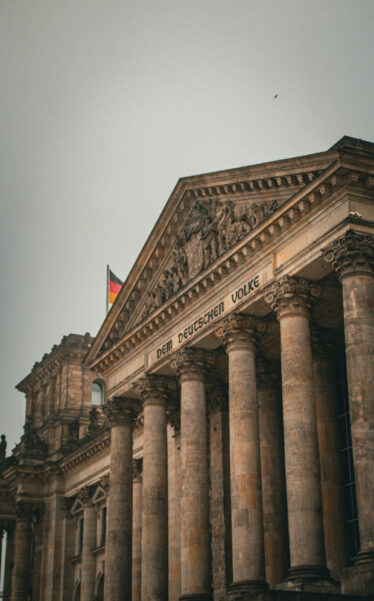The German media landscape has undergone a radical transformation in recent years, marked by the rise of the far right and its growing influence on public opinion.
Both freedom of the press and freedom of expression are enshrined in the Constitution. For this reason, Germany faces an unprecedented challenge: balancing the diversity of voices in an increasingly polarized environment.
Political and Social Context
To understand this phenomenon, it is essential to analyze Germany’s political and social context. After World War II, the country stood out for its efforts to confront its Nazi past, establishing memory policies and rejecting any form of authoritarianism.

Freedom of the press and expression is guaranteed by the German Constitution. The media landscape is structured around a dual system of public and private media. Public broadcasters are mainly funded by a radio and television fee paid by each household, while private media rely on advertising revenue and sales.
However, over the past decade, the rise of the Alternative for Germany (AfD) party has shaken this consensus. Founded in 2013 as a Eurosceptic movement, the AfD has evolved into a populist right-wing platform that exploits concerns about immigration, Islamization, and German identity.
The rise of the AfD has been driven by several factors, such as the 2015 refugee crisis, growing distrust of traditional political institutions, and the perception that the government is not adequately addressing the concerns of the middle and working classes. In the 2021 federal elections, the AfD consolidated its political relevance, especially in eastern German states, where it has capitalized on the discontent stemming from reunification and persistent economic inequalities.
AfD and Public Media Funding
The financing of political parties in Germany is strictly regulated by laws requiring transparency regarding donations and the origin of funds.
However, the AfD has been embroiled in controversy due to its use of anonymous donations and foreign funds, raising concerns about the influence of external actors on German politics.

The party has received large amounts of money from private donors, some of whom prefer to remain anonymous, which has raised questions about compliance with funding regulations.
The reason behind the ban on receiving foreign funds is to avoid external influences in the national political process.
German authorities believe that foreign funding could compromise the independence of political parties and, therefore, affect the country’s democratic decisions.
The issue of foreign donations has been the subject of investigation.
In 2019, for example, the AfD was fined for receiving illegal funds from Switzerland, violating German laws that prohibit foreign financing.
In this case, it was a transfer of funds from Switzerland, carried out through a foundation linked to a member of the AfD. This led to an investigation and, eventually, a fine.
The party has managed to attract some business and wealthy sectors who see in the AfD an opportunity to promote policies favorable to free markets and reducing regulations.
They argue that by reducing state intervention in the economy, innovation will be driven, jobs will be created, and individual entrepreneurship will be encouraged. Additionally, they believe that companies will have the freedom to grow without the bureaucratic barriers that usually hinder their development.

Its anti-immigrant and anti-European Union rhetoric has also resonated with donors concerned about Europe’s political direction and the economic implications of immigration.
Like any party with parliamentary representation, the AfD receives state subsidies based on the number of votes and seats obtained in elections. This financial support is crucial for its political activity and electoral competitiveness.
However, this access to public funds depends on the party complying with transparency regulations, an issue that has been problematic for the AfD due to undeclared donations.
The party has also proposed radical changes to public media financing.
In its political program, the AfD demands the elimination of the “mandatory funding” of public media, advocating for a paid television model.
Moreover, the party has complained that its members are not regularly invited to television programs, which they consider part of a media bias against them.
AfD’s Communication Strategy
The AfD has strategically used its funding to increase its presence in the media and on social networks, which has been key to its success. With a considerable budget, the party has launched effective advertising campaigns designed to appeal to the fears and frustrations of specific sectors of German society.

It has heavily invested in digital communication strategies, leveraging social media to disseminate nationalist and anti-immigration messages, thereby connecting with a young and active online electorate.
Additionally, the party has used targeted advertising techniques, sending tailored messages to specific voter subgroups based on their interests, location, and online behavior.
For instance, in rural areas or eastern Germany, where the AfD has stronger support, the messages tend to be more nationalist and anti-immigration.
For younger audiences, they have adopted an “anti-establishment” approach, using memes and popular cultural references to capture attention.
However, the AfD has been criticized for amplifying fake news and conspiracy theories, particularly on topics related to immigration and security. These tactics foster fear and insecurity among voters, reinforcing the demand for more restrictive policies and discrediting traditional media.
Impact on Public Discourse
The growing influence of the far-right has changed the political landscape in Germany. Issues once considered taboo, such as extreme nationalism or Holocaust denial, have resurfaced in public debate. This resurgence is partly due to the AfD and its supporters, which has led to increasing polarization in society.
Anti-immigrant and xenophobic rhetoric, once marginal, now finds more space in public discourse. As a result, hate crimes and violence against minorities have risen.
Unfortunately, some regions in Germany show a hostile climate toward immigrants, especially those from Muslim countries or vulnerable situations. The AfD’s rhetoric has fueled these tensions, making debates about immigration more intense and polarized.

Additionally, the rise of the far-right has complicated Germany’s integration and diversity policies.
AfD leaders openly question Germany’s ability to absorb more refugees. They promote a vision of national identity that is more homogeneous.
This vision has deepened the divide over multiculturalism and immigration. While some support these ideas, others fear that they undermine Germany’s traditional values of inclusion and solidarity.
This shift in public discourse has also affected domestic politics. Both left- and right-wing parties feel pressured to adjust their positions. Some respond to the AfD’s demands, while others defend democratic values. As a result, German politics has become more fragmented. Immigration, cultural diversity, and nationalism now dominate an increasingly tense and polarized conversation.
Conclusion
The rise of the far-right represents a significant challenge for the German media and democracy. To preserve the integrity of the media landscape and protect democratic values, it is crucial to promote transparency, accountability, and diversity, while also strengthening society’s critical skills.
It is undeniable that the growing presence of the far-right has deeply altered public discourse, reopening difficult debates about national identity, immigration, and the country’s core values. While some of their ideas remain widely rejected, their influence is reshaping the political landscape in a significant way.
Journalistic independence must be a priority. Freedom of expression cannot exist without protecting those who dare to question and challenge. In this sense, the media’s responsibility goes beyond just informing; it involves a commitment to the principles of accuracy, impartiality, and transparency.


